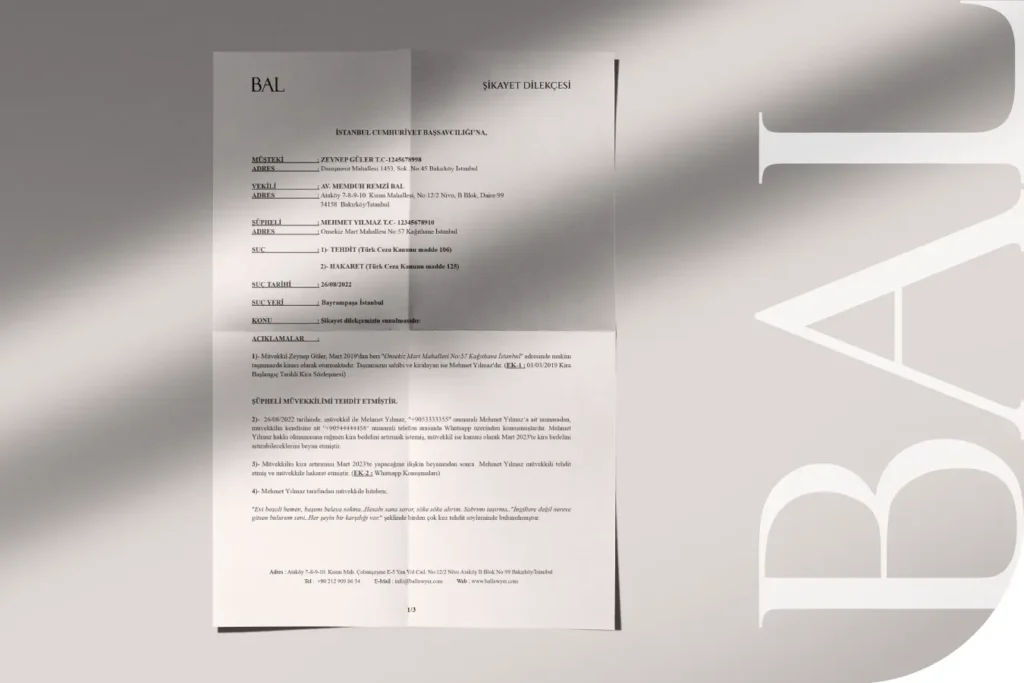
I. What is a Complaint in Criminal Proceedings?
A complaint is the declaration of the will of the victim or the person harmed by the crime to the competent authorities, requesting investigation and prosecution of the act constituting the crime. Complaints are made for crimes where a complaint is required for investigation and prosecution.
Crimes that are subject to complaint are those where the victim or the person harmed by the crime must personally, through their representative, or attorney, be the complainant in order for an investigation or prosecution to be conducted. As a general rule, the investigation and prosecution of crimes regulated in criminal laws are not subject to complaint. Complaint-dependent crimes are exceptions.
The complaint must be made by the persons against whom the crime has been committed. Complaint is a right and is possible for every crime. Additionally, the right to complain is a right closely linked to the individual.
II. Difference Between Report and Complaint
A report is the notification to the competent authorities by any person in any way that a crime has been committed. Reporting occurs when a person who becomes aware of a crime that is prosecuted ex officio informs the competent authorities. The person reporting the crime may be the victim of the crime, but it can also be a third party unrelated to the crime.
In crimes where prosecution is not dependent on a complaint and is prosecuted ex officio, the notification made by the victim of the crime is technically considered a report rather than a complaint. Individuals who become aware of a crime are obligated to report it.
Complaint, on the other hand, is only relevant in the context of crimes where prosecution is dependent on a complaint. It is not an obligation. If a person has suffered from a crime that requires prosecution ex officio or is not dependent on a complaint, the application they make is considered a report rather than a complaint.
III. How to File a Complaint?
The authorities where complaints can be made are:
- Public Prosecutor’s Office
- Police Stations
- If abroad, Turkish embassies and consulates
You can also make complaints to the Governorship, District Governorship, or the court. Governorship and District Governorship offices forward complaints to the relevant public prosecutor’s office. Any complaint made to places other than these authorities is not considered valid.
Complaints can be made in written or oral form. We recommend making a complaint to the prosecutor’s office or the police in the form of a written petition. If you are called by the competent investigation and prosecution authorities to take your statement, you can also state that you are filing a complaint by indicating that you are the complainant.
When making your complaint, it is necessary to explain the incident that is the subject of the crime. If the victim or the harmed party has clearly indicated a specific incident and expressed their will for the punishment of the perpetrator due to suffering damages, a valid complaint is present.
In order for the complaint to be valid, you must use a statement indicating that you want a public case to be opened and a trial to be held.
- “I am the complainant.”
- “I am the plaintiff.”
- “I demand punishment.”
Such statements are sufficient.
The complainant is reporting an incident that caused them harm or the actions of specific individuals and is requesting punishment for these actions. It is not important how the victim classifies the incident. Furthermore, the victim does not need to specify the perpetrator(s) of the incident in the complaint. However, if known, specifying them would be beneficial for the outcome and duration of the investigation. Mischaracterizing the action in the complaint does not invalidate it. The public prosecutor will characterize the action in question.
If there are multiple victims of the crime, each of them has the right to complain. It is sufficient for one of them to be the complainant for an investigation and prosecution to be conducted.
IV. When to File a Complaint?
In crimes dependent on a complaint, the right to complain lasts for 6 months. The 6-month period starts from the day the victim or harmed party becomes aware of the act constituting the crime and who the perpetrator is. The 6-month statute of limitations period does not start solely from the discovery of the act constituting the crime. It also begins when the perpetrator is identified.
V. Complainant’s Rights
The complainant’s rights during the investigation stage;
- Requesting the collection of evidence,
- Requesting document samples from the public prosecutor,
- Requesting the appointment of a lawyer by the bar association in crimes requiring a minimum of five years of imprisonment for sexual assault offenses,
- Examining the investigation documents and seized items through their representative,
- Appealing against the decision of non-prosecution.
The complainant’s rights during the prosecution stage include:
- Requesting to be notified of the trial,
- Participating in the public prosecution,
- Requesting samples from minutes and documents,
- Requesting the summoning of witnesses,
- Requesting the appointment of a lawyer by the bar association in crimes requiring a minimum of five years of imprisonment for sexual assault offenses,
- Appealing against the decision.
VI. What Happens If No Complaint Is Filed?
In crimes dependent on a complaint, if the victim or harmed party does not file a complaint, no investigation or prosecution will be initiated. Therefore, the perpetrator will not face any punishment. If no complaint is filed, the public prosecutor cannot initiate an investigation. Additionally, if a complaint is filed after the expiration of the 6-month period, the perpetrator will not face any punishment.
VII. What Happens If I Withdraw My Complaint?
In crimes dependent on a complaint, withdrawing your complaint results in the dismissal of the case. However, if you withdraw your complaint after the verdict has become final, it holds no significance. If you withdraw your complaint against one of the perpetrators in a joint offense, it is considered withdrawn against the others as well. You cannot withdraw your complaint against one and continue it against another.
Furthermore, for the withdrawal of the complaint to take effect, the defendant must accept it. If the defendant does not accept it, the investigation and prosecution will continue. If the complainant’s withdrawal of the complaint leads to the dismissal of the public prosecution, they can no longer initiate a civil lawsuit.
VIII. Crimes Subject to Complaint
Some crimes that are subject to complaint are listed below. Unless the victims or the aggrieved parties file a complaint, no investigation or prosecution can be initiated for these crimes. These crimes include:
- Intentional Simple Injury
- Injury by Negligence
- Simple Sexual Assault
- Commission of Qualified Sexual Assault against Spouse
- Sexual Relations with a Minor
- Simple Sexual Harassment
- Threat of Property Damage and Other Mischief
- Violation of Residential and Workplace Immunity
- Violation of Labor and Employment Freedom
- Disturbance of Persons’ Peace and Tranquility
- Defamation (excluding Article 125/3-a of the Turkish Penal Code)
- Violation of Communication Privacy
- Interception and Recording of Conversations Between Individuals
- Violation of Privacy of Personal Life
- Theft Committed by Stakeholder or Co-owner for the Purpose of Debt Collection Based on Legal Relationship
- Theft by Use
- Property Damage
- Simple Form of Misuse of Trust
- Use of Unpaid Promissory Note
- Fraud for the Purpose of Collecting Legal Debts
- Disposition of Lost or Accidentally Acquired Property
- Misuse of Public Signature
- Crime against a Foreign Head of State
- Insult to a Foreign State Flag
- Insult to Foreign State Representatives
- Crime Committed by a Citizen Abroad
- Crime Committed by a Foreigner Abroad
Send Mail : info@ballawyer.com
Call Us : +90 212 909 86 34
